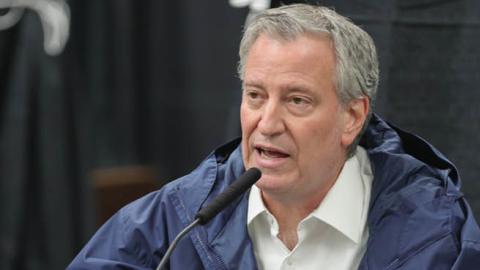New York City Mayor Bill de Blasio’s Jewish-oriented coronavirus tweet of this past week is bad enough. When placed in context of growing global anti-Semitism, it is tragic.
De Blasio’s outburst (“[m]y message to the Jewish community, and all communities, is this simple: the time for warnings has passed”) which had ignited a firestorm among Jewish community leaders, took place following the funeral of a beloved rabbi, Chaim Mertz, that attracted a large gathering in the Williamsburg neighborhood of Brooklyn (for which permission had been granted). Rather than proper coronavirus protocol, many quite understandably saw the mayor’s words as an assault on New York’s 1.2 million Jews.
Other NYC gatherings in recent days have also drawn large crowds, with “hundreds packed shoulder to shoulder” to see celebratory flyovers by the military’s aerobatic Blue Angels and Thunderbirds. The Jewish funeral, however, whose participants were easily identified as religious Jews wearing traditional attire, seemed to be the sole trigger for the mayor’s ire.
Unfortunately, de Blasio’s outburst took place against a backdrop of Jewish anxiety over steadily rising anti-Semitism – much of which makes the mayor’s comments look quite mild.
As the New York Times reported earlier this year, “[a]nti-Semitic violence in the New York area has been more frequent lately than at any time in recent memory, with three people killed in a shooting at a kosher supermarket in Jersey City, N.J., and five injured in a knife attack at a rabbi’s home in Monsey, N.Y.” The victims were Jewish in more than half of the 428 hate crimes in the city last year, and anxiety is increasing “in Jewish communities around the United States, fueled in part by deadly attacks on synagogues in Poway, Calif., last April and in Pittsburgh in 2018. ”
Overseas, the coronavirus pandemic highlights a similar but worldwide threat: escalating global anti-Semitism which has inspired hateful accusations against Jews and Israel.
Al Arabiya reported in early April that Iranian leaders, beginning with Supreme Leader Khamenei and his followers, have accused Jews, Israel, and Zionists of developing and spreading COVID-19. To elaborate, Khamenei hosted a cleric named Ahmad Abedi, who said, “There is no doubt that the Jews, especially the Zionists, are very much after such supernatural affairs, and are after demon and devil related affairs. Even their spy agencies, like the Mossad, are involved. There is plenty of evidence.
Such vitriol comes on the heels of reports about surging anti-Semitism in Europe, where vandalism, violence, and persecution of Jews are widespread. Incidents of homes being set ablaze in Sweden and synagogues attacked in Germany are only several of many.
With global anti-Semitism in mind, it is no wonder that Jewish communities not only in New York but across the world have reacted with alarm at Mayor de Blasio’s remarks. Haaretz, an Israeli newspaper, quoted Avi Greenstein, CEO of the Boro Park Jewish Community Council:
“[W]hen we see that type of tweet from the mayor it really does raise great alarms and it’s concerning because of that generalization… I’m terrified that things like this could cause a rise in anti-Semitic hate crimes.”
Mayor de Blasio has since offered a semi-apology for his tweet: “I regret if the way I say it in any way gave people a feeling of being treated the wrong way – it was not my intention," de Blasio said at his daily coronavirus press briefing Wednesday. “It was said with love, but it was tough love.”
Yet he will have to do more if he wants to be a part of the solution, as merely backtracking on some of his words won’t do much to address religious freedom concerns and the tide of rising anti-Semitism.
If the mayor wants to be constructive, he could work to ensure state authorities classify religious entities and clergy as “essential” during this time – a policy which will enable them to operate more freely yet stay within health and safety guidelines. He can also show his support for religious communities by issuing guidance on how authorities can protect their religious freedom during the coronavirus, helping ease their concerns about the lockdown.
Either of these steps would be helpful. The mayor’s Jewish-focused tweets only add fuel to the fire. He should cease targeting any religious community, and rather turn his attention to policies that will actually support their flourishing and freedom.
Read in RealClear Religion



















